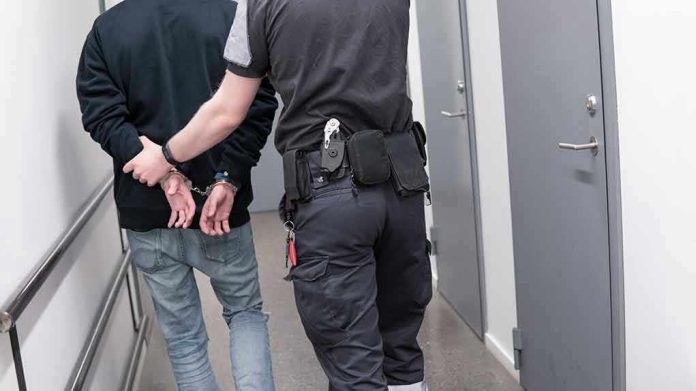
The stunning revelation of over 150 illegal immigrant sex offenders arrested in Florida’s “Operation Dirtbag” forces us to confront the hidden depths of America’s border crisis—and leaves us wondering how many more predators remain undetected.
Story Snapshot
- More than 150 illegal immigrants identified as sex offenders were arrested in a major Florida operation.
- DHS Secretary Kristi Noem led and publicized the crackdown, amplifying its national significance.
- Operation Dirtbag focused specifically on sexual predators, setting it apart from typical immigration sweeps.
- The arrests underscore escalating political and public tension over border security and crime.
Florida’s Law Enforcement Gambit: Operation Dirtbag Unveiled
Florida’s streets became the backdrop for a law enforcement effort so sweeping that it stunned both supporters and critics of tough immigration policy. “Operation Dirtbag,” as it was dubbed, did not simply round up undocumented migrants; it targeted those with records of sexual offenses, aiming straight at the heart of public safety concerns. The announcement landed on November 12, 2025, but the operation had been quietly unfolding for weeks, coordinated between federal agents and local police. The stakes were high, the scope unprecedented—with more than 150 alleged predators removed from communities.
Kristi Noem, newly appointed Secretary of Homeland Security, seized the moment to put her stamp on the agency. Noem’s media blitz and official statements positioned the operation as a model of decisive action—calling attention to both the scale of arrests and the specific focus on sexual offenders. Drawing on Florida’s political significance and the state’s sizable immigrant population, Noem aimed to show that law enforcement can be both targeted and effective, leveraging federal authority to support state priorities. The message was unmistakable: unchecked borders have consequences, and the federal government is ready to intervene when public safety is at risk.
Setting the Stage: Political Tensions and Historical Context
“Operation Dirtbag” did not emerge in a vacuum. Its origins trace back through years of escalating debate over immigration enforcement and public safety. Past federal operations—like “Operation Predator” and “Operation Return to Sender”—laid the groundwork, but rarely reached the publicity or scale seen in Florida this year. The timing was critical: public scrutiny of border security had intensified, and political leaders faced mounting pressure to act. Kristi Noem’s leadership amplified the response, channeling conservative values and a common-sense call for accountability. The operation’s publicity was as much about sending a message as making arrests.
Key stakeholders included DHS, Florida law enforcement agencies, and the arrested individuals themselves. The power dynamic was clear: federal coordination enabled state action, while Noem’s role elevated the operation’s visibility. Law enforcement officials described their motivation as straightforward—removing dangerous criminals and restoring community trust. For immigrant communities, however, the crackdown raised fears of profiling and collective punishment, highlighting the delicate balance between security and civil liberties.
Impact and Repercussions: What Comes Next?
The immediate aftermath saw over 150 individuals taken into federal custody, pending legal proceedings and likely deportation. Kristi Noem’s statements emphasized the urgency of removing “dangerous individuals,” while DHS and Florida authorities hinted at ongoing reviews for further arrests. For local communities, the operation promised a short-term sense of safety, but also stirred anxiety and debate. The economic cost of such large-scale enforcement is substantial, from operational expenses to lengthy court battles. Socially, the operation risked deepening divides—heightening tensions around immigration, crime, and the treatment of undocumented residents.
Kristi Noem announces more than 150 illegal immigrant sex offenders arrested in massive Florida crackdownhttps://t.co/BdGUg05e2y
— Trump War Room (@TrumpWarRoom) November 12, 2025
Long-term effects remain uncertain. Supporters argue that operations like Dirtbag deter future criminal activity and restore faith in law enforcement. Critics warn of overreach, potential racial profiling, and erosion of due process protections. Advocacy groups may intensify calls for oversight, while law enforcement agencies are likely to see increased funding for similar efforts. The story’s broader significance lies in its potential to reshape immigration enforcement—and the national conversation—well beyond Florida’s borders.
Expert Perspectives: Balancing Enforcement and Rights
Law enforcement experts generally support operations targeting criminal offenders, especially those with histories of sexual violence. They caution, however, that broad sweeps risk collateral damage, ensnaring low-level offenders or those with disputed records. Immigration policy analysts point to the necessity of due process, warning against conflating criminality with immigration status—a distinction central to American legal tradition. Criminologists agree targeted enforcement can boost public safety, but only when balanced with civil liberties and community trust.
Legal scholars raise concerns about transparency and the rights of those arrested, questioning whether such operations meet constitutional standards. The debate is not new, but the scale and publicity of Operation Dirtbag have magnified its stakes. Supporters see a victory for law and order; critics see a dangerous precedent. What remains clear is that the story has only begun to unfold, with ripple effects likely to shape immigration policy for years to come.
Sources:
iHeartRadio, “More Than 150 Illegal Migrant Predators Nabbed In ‘Operation Dirtbag'”
Fox News, “DHS announces more than 150 illegal alien sexual predators …”



